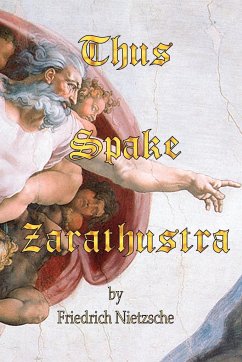
Thus Spoke Zarathustra
Versandkostenfrei!
Versandfertig in 1-2 Wochen
31,99 €
inkl. MwSt.

PAYBACK Punkte
16 °P sammeln!
"Dead are all gods: now we want the overman to live." Thus Spoke Zarathustra is a parable by German philosopher Friedrich Nietzsche on 'God is dead' as well as his concept of the "Superman". The book chronicles the teachings of the prophet Zarathustra, who descends from his mountain retreat to awaken the world to its new salvation. Through his teaching, Zarathustra accentuates the significance of self-improvement in one's life for procuring strong internal power. A landmark work of philosophy and literature, Thus Spoke Zarathustra is the fullest expression of Nietzsche's belief that ""the obje...
"Dead are all gods: now we want the overman to live." Thus Spoke Zarathustra is a parable by German philosopher Friedrich Nietzsche on 'God is dead' as well as his concept of the "Superman". The book chronicles the teachings of the prophet Zarathustra, who descends from his mountain retreat to awaken the world to its new salvation. Through his teaching, Zarathustra accentuates the significance of self-improvement in one's life for procuring strong internal power. A landmark work of philosophy and literature, Thus Spoke Zarathustra is the fullest expression of Nietzsche's belief that ""the object of mankind should lie in its highest individuals".













